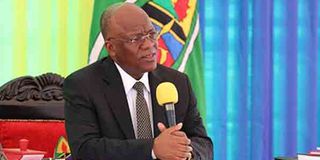Amnesty International joins Tanzania’s family planning debate

President John Magufuli.
What you need to know:
- Amnesty International’s statement comes about four days after Tanzania’s Ministry of Health, Community Development, Gender, Elderly and Children suspended USAID-Funded family planning commercials on television and radio which were being aired in local media.
Dar es Salaam. A London-based human rights organisation, Amnesty International on Saturday September 22 issued a statement urging Tanzania to “remove barriers on family planning services.”
Amnesty International’s statement comes about four days after Tanzania’s Ministry of Health, Community Development, Gender, Elderly and Children suspended USAID-Funded family planning commercials on television and radio which were being aired in local media.
On Wednesday September 19, the ministry’s Permanent Secretary Dr Mpoki Ulisubisya wrote a letter to the Chief of Party of FHI 360, a US-based organization operating in Tanzania, directing it to immediately stop the adverts it was running under the USAID’s Tulonge Afya project, saying the government intended to revise the message contained in the ads.
Amnesty International, has described the government’s decision to suspend the ads as “an attack on sexual and reproductive rights.”
The organisation’s Deputy Director for East Africa, the Horn and the Great Lakes, Seif Magango said in a statement that there’s no doubt that sexual and reproductive rights are coming under increasing attack in the country.
However, Tanzania’s ministry of health Assistant Director of Reproductive and Child Health Services Programme Dr Ahmad Makuwani has assured The Citizen that the adverts would resume in the next two months.
Dr Makuani said, "The programmes will resume...between November and December this year, if everything goes as planned. As we are currently revising the content in the programmes," he said.
He is the ministry’s focal person on reproductive health, however, he declined to comment further on what content exactly the government intended to revise.
USAID speaks out
When approached for comment, USAID—the funding organisation for the suspended commercials, said, “The U.S Government remains committed to a peaceful, secure, prosperous, and healthy Tanzania.” The comment was issued by Benjamin Ellis, U.S Embassy Press and Information Officer.
How Tanzania’s FP agenda began
The family planning agenda in Tanzania was triggered by President John Magufuli’s remarks during his recent tour of the Lake Zone. The President chided those who embraced family planning, terming them "lazy."
President Magufuli said those who use contraception do not want to work hard and trying to avoid the responsibility of feeding their children. He urged women in Tanzania to continue reproducing because the country needs more people.
The President spoke in the presence of the United Nations Population Fund (UNFPA) representative in Tanzania Jacqueline Mahon and the minister for Health Ummy Mwalimu.
"I have travelled to Europe and elsewhere and have seen the harmful effects of birth control. Some countries are now facing declining population growth. They are short on manpower," said President Magufuli.
There is no indication, however, that President Magufuli’s opposition to birth control would lead to change in policy but the remarks he made, have sent mixed signals to the public and international media.
Some western media outlets have used his stance on contraception to question the government’s policy stance, with UK’s Mail on Sunday campaigning for withdrawal of funding to Tanzania.
However, the United Kingdom’s Department for International Development (DFID) which commits a significant amount of money to FP in Tanzania said that the UK’s approach to FP was aligning with Tanzania’s national policy and it[DFID] remained in regular dialogue with the relevant ministries.
Ahead of the government’s move on adverts cancellation, DFID exclusively told The Citizen that the UK still believes in empowering women and children so that they can make better health choices.
“By giving young women choice over when they have children, we’re helping them make better, safer health choices, and allowing them to make the most of their education and opportunities so that they can contribute to the growth of their societies and communities,’’ said the DFID spokesperson in an email response sent to The Citizen on Wednesday September 19.
Tanzania adopted family planning policy, which accepts various measures of birth control, in 1976, one year after the UNFPA opened its office in the country.
The government raised the family planning budget by 60 per cent for current financial year of 2018/2019 as it seeks to meet the growing demand for of such services across the country.
Additional reporting by John Namkwahe




